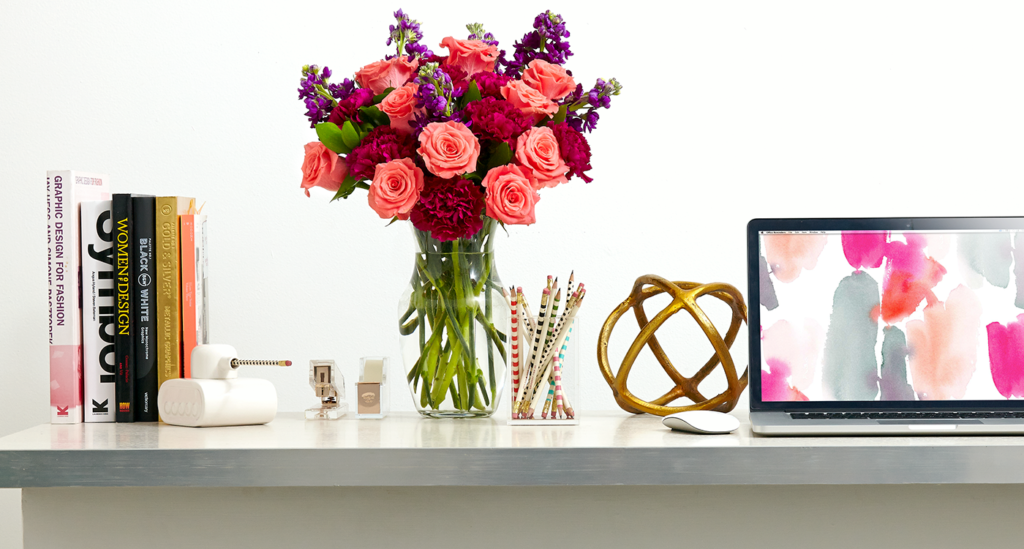Image Credit: www.proflowers.com on Flickr
An office isn’t just an office; think of it more as a sacred space for unleashing your creative genius. When your work space is correct, inspiration comes easily and productivity soars.
Here’s some advice for creating the perfect spot to do your best work.
RELATED ARTICLE: HOW TO CREATE THE PERFECT HOME OFFICE
Don’t Opt for Converting the Spare Room Without Deliberation
Can you choose which room to use for your office? Is your current bedroom a better area to work in? If so, make the switch.
You want your home work space to be in an optimal location for both space and comfort. Two elements will have the greatest potential effect on your comfort level: the material that covers the floor, and the material over the windows.
Window coverings should give you the right lighting and privacy. In east- and west-facing rooms, they’ll keep the sun (and its heat) from coming strongly through the windows.
The ideal type of blinds for your needs will depend on the characteristics of the room you choose to turn into your work space. For instance, if you live on a gravel road, you’re likely to have dust in every room in the house, and that requires blinds that are easy to clean. Choose your window coverings based on needs, not what just looks terrific in the store.
Your floors will either absorb or deflect sound and temperatures. Lean toward carpet if you plan on creating YouTube videos or podcasts, because if you don’t do that, you’ll sound as if you’re working inside a tin can. Install baffles on the ceiling for a more professional acoustic setup.
If you prefer hardwood floors, get an area rug to place beneath your desk. That will absorb some of the sound and reduce scuff marks from your chair. Plus, the right rug can make your work space look fairly classy.
Keep Your Work Space Cool in the Summer and Warm in the Winter
Everyone has a particular room in the house that gets hotter than the others during the summer. You’ll spend most of your day in your office, so make sure you can regulate the temperature there. Make room for an air conditioner, a fan, and a heater if necessary.
Don’t Forget the Door
Before you get creative and build your home office in an alcove, remember how you’ll be affected by the home office tax deduction. If you’re used to taking this deduction for a significant cut in taxable income, you’ll want to plan on building a door for your new work space.
As of 2017, the home office deduction requires a door or some type of closure that will turn your office into a fully contained room. Remember, if you can’t claim this deduction, you won’t be able to deduct any fraction of your electricity bill or rent.
This new rule removes the home office deduction for most entrepreneurs who live in studio apartments and trailers. In the past, it was enough to have a separate area sectioned off with dividers.
Home office rules change often, so this rule may switch again in the future.
Plan, Plan, Plan
Planning the creation of a home office may sound boring, but there’s more to it than just moving furniture and setting up your computer. The technical details will take care of themselves.
What you need to plan are the aesthetics so that you can align the décor with your intentions. For example, every piece of décor you add to your office will affect your mood. The color you paint the walls will have an effect on your brain function.
Try these color ideas to invoke your creative or task-oriented spirit. Recall that colors such as deep gray will blend with almost any other color and won’t make wood grains stand out.
Yellow is a popular hue for keeping one’s mood elevated, but after a while you might find it oppressive. Choose a color you think you can live with for a good while.
For a modern look, paint at least one wall with two tones and place a shelf along the dividing line. Remember to paint the baseboards!
Set Boundaries with Other Inhabitants
Being self-employed means contending with a general misconception that you’re available around the clock. It’s not intentional, but seeing you grab a glass of water in the middle of your workday can give others the impression you’re at leisure.
They don’t know you might be going over a business plan in your mind when you pour a glass. Someone attempts a conversation and takes it badly when you ask him or her to delay talking with you until later.
The best way to avoid that unpleasantness is to set strict boundaries with other members of your household. Set your schedule and stick to it. Define your hours of availability, post them on your office door, and don’t make exceptions.
Let people know that by respecting your boundaries, you’re better able to give them your full attention by carving out time specifically for them.
